The 2024 Hoosier Resilience Heroes include professionals, students, and volunteers dedicated to climate policy, renewable energy, sustainable practices, and more. Read about the heroes and their contributions to Indiana communities and the state.
2024 Hoosier Resilience Heroes

Juan Carlos Arango
co-owner, Sobremesa Farm
BLOOMINGTON—After a decade of experience volunteering with the Center for Sustainable Living to certify residences, churches, and public spaces as Backyard Habitats through the National Wildlife Foundation, Juan Carlos Arango opened Sobremesa Farm in 2014 to practice organic, regenerative agriculture. The permaculture farm has become a model for small-scale farmers interested in sustainable practices, such as carbon sequestration, rain-water catchment systems, and soil conservation. Named after the Spanish word for the period following a meal when people share stories and connect, Sobremesa Farm has welcomed people of all backgrounds to participate in ag workshops and learn about permaculture practices. In 2022, Arango began a collaboration with Exodus Refugee to give new refugees to the Monroe County area employment opportunities. Sobremesa Farm is a two-time recipient of the Monroe County Soil and Water Conservation's Conservation Steward of the Year award and was featured at Farm Aid 2023. In 2014, Arango was named Minority Landowner Farmer of the Year by the Natural Resources Conservation Service.
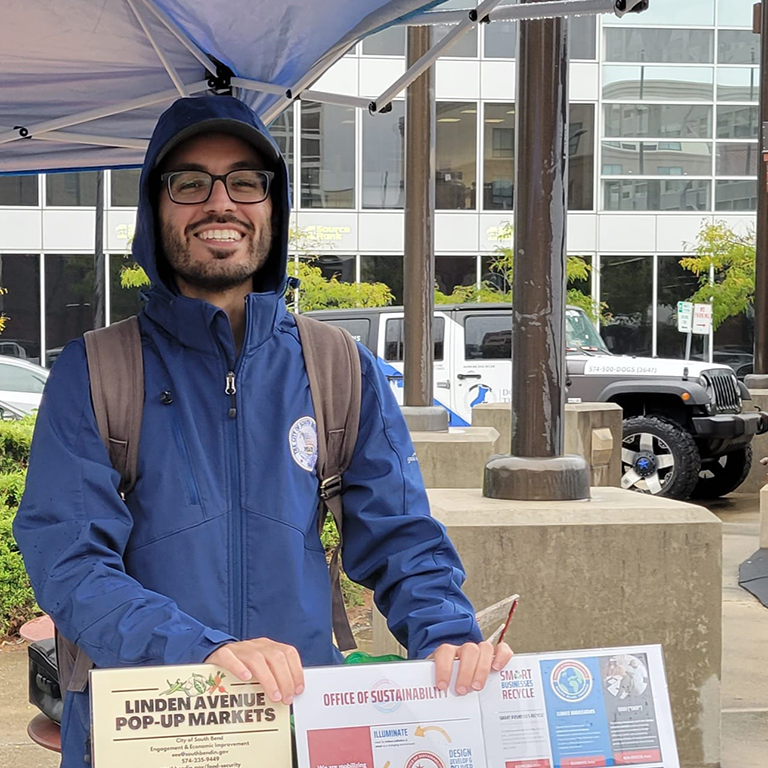
Alex Bazán
sustainability director, City of South Bend
SOUTH BEND—In just a few years, Alex Bazán has helped the City of South Bend make significant strides in the adoption of energy efficiency practices and solar installations. In 2022, he started the Energy Assistance and Solar Savings Initiative (EASSI), which provides energy assessments, grants, and low-interest loans to community organizations to complete energy efficiency and solar projects. In two years, EASSI has helped 27 nonprofits lower their energy costs and work toward energy independence. To date, the program has spurred more than $1.7 million in public and private investment in energy efficiency and solar. Prior to joining South Bend’s sustainability office, Bazán, a Northwest Indiana native, co-founded the Highland Neighbors for Sustainability, a grassroots organization that engages residents of the Region on climate and environmental issues. The organization played a leading role in coordinating Indiana’s first regional greenhouse gas inventory, a precursor to developing a climate action plan for Northwest Indiana communities.
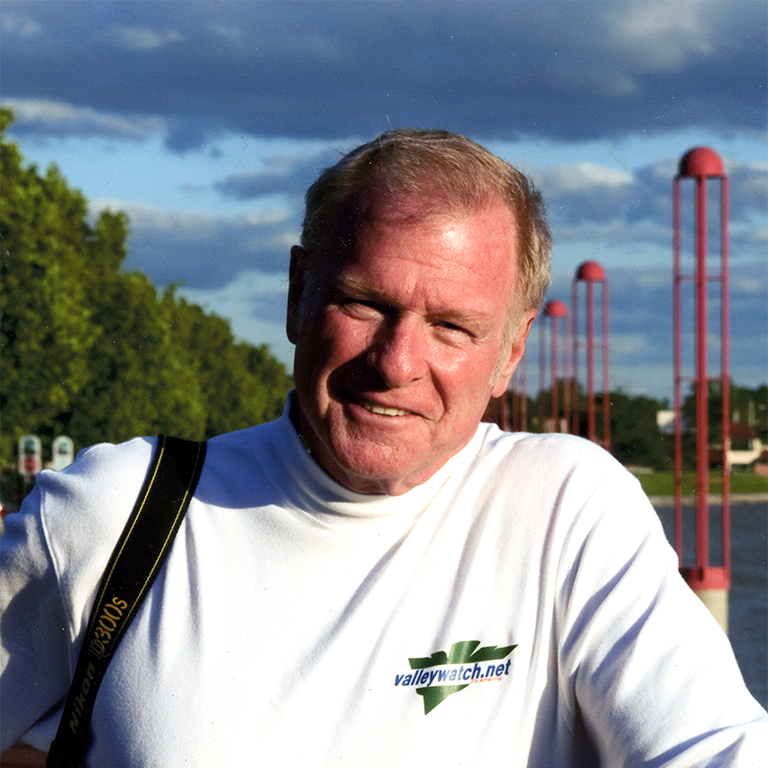
John Blair
founder, ValleyWatch, Inc.
EVANSVILLE—A 1978 Pulitzer Prize winner for news photography, John Blair leveraged the award to draw attention to southwestern Indiana’s nascent environmental community as well as the monthly newspaper he published in the early 1980s, the Ohio Valley Environment. Blair founded Valley Watch, an Evansville-based environmental health advocacy organization, and has served as its president since 1984. From 1988 to 1990, he was a director of the Hoosier Environmental Council, Indiana’s largest environmental advocacy organization, and served as its president. In the early 2000s, Blair served on the executive committee and as energy chair of the Sierra Club Hoosier Chapter. Locally, Blair is credited with keeping large-scale polluters out of Indiana, Kentucky, and Illinois. He attracted media attention in 1985 when he attempted to “steal” the groundbreaking shovels of a hazardous waste facility in Henderson, Ky. Most recently, Blair, Valley Watch, and Southwest Indiana Citizens for Quality of Life, another organization Blair helped form, fought to keep a proposed coal-to-diesel plant from being built in Dale, Ind. Blair has almost always worked as a volunteer, as have all Valley Watch contributors.
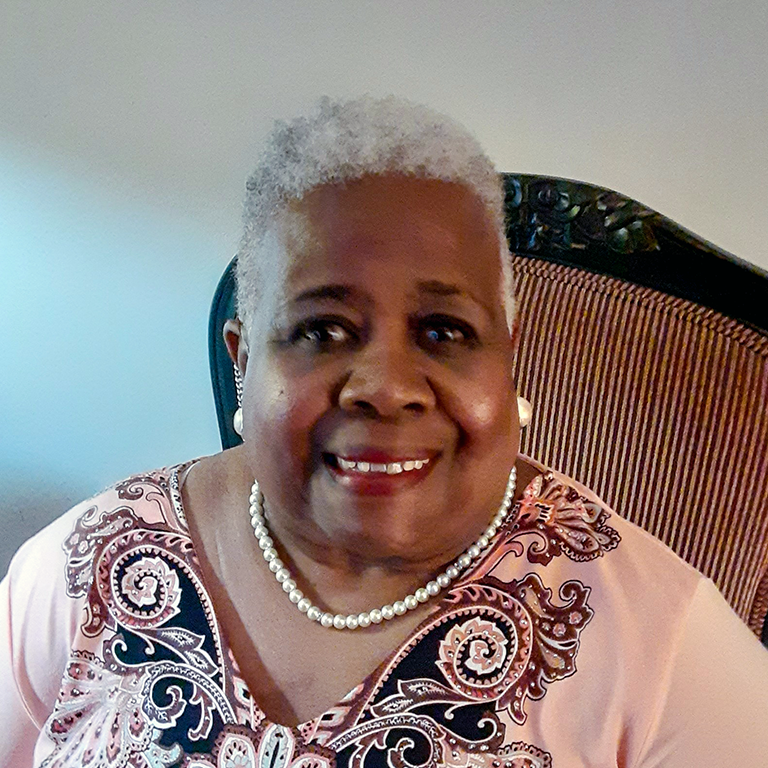
Liz Gore
chair, Martindale Brightwood CDC Environmental Justice Collaborative
INDIANAPOLIS—As a longtime resident and community leader of the Martindale-Brightwood neighborhood, Liz Gore has devoted decades of her life to environmental justice causes in northwest Indianapolis. A historically redlined neighborhood, Martindale-Brightwood has suffered from pollution and poor air quality from industry and nearby highways. As chair of the Martindale Brightwood Community Development Corporation’s (CDC) Environmental Justice Collaborative, Gore convened a neighborhood task force in 2016 to address unresolved lead contamination within the community and educate residents about its health risks. That year, the US Environmental Protection Agency removed over 25,000 tons of contaminated soil from 103 properties that were overlooked during past cleanup efforts. Previously, Gore served as the Martindale Brightwood CDC’s president. Her advocacy for equity and environmental justice also extends to the city’s 2017 land use plan and the Indiana Department of Transportation’s 2018 plan to reconfigure the I-65/I-70 interchange. In 2022, she helped bring affordable housing to Martindale-Brightwood as well as upgraded amenities to the Heritage Community Garden and Pocket Park.

Pamela Guerrero
program and policy analyst, Indiana Office of Community & Rural Affairs
INDIANAPOLIS—As the senior program and policy analyst at the Indiana Office of Community and Rural Affairs (OCRA), Pamela Guerrero was instrumental in introducing a green infrastructure incentive for local governments applying for grants from the State's Community Development Block Grant Program. The incentive boosts grant applications for wastewater, stormwater, and drinking water projects that incorporate natural elements into the infrastructure design, such as utilizing bioswales to manage stormwater runoff, and has increased awareness about these components' benefits in infrastructure projects. Guerrero has also been actively educating rural communities on sustainable best practices for construction projects. Throughout her two years at OCRA, she has facilitated community-centered programs focusing on extreme heat, wastewater and drinking water, stormwater management, local leadership capacity building, and pandemic response. Outside of her work with OCRA, Guerrero is pursuing a Master of Public Affairs in environmental policy and sustainability through the IU O'Neill School of Public and Environmental Affairs.
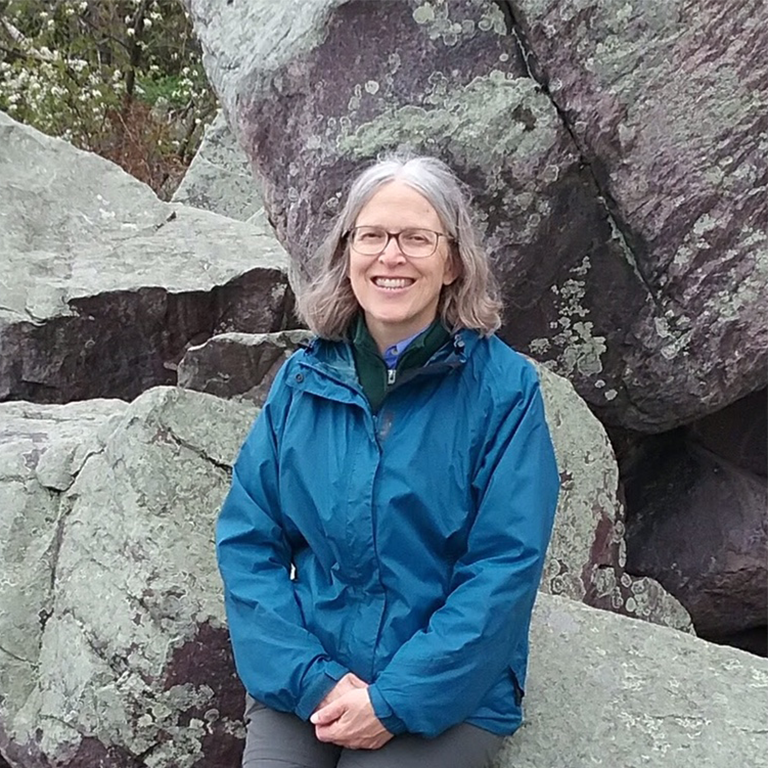
Gwen Halsted
local facilitator, Richmond Advocacy Team for the Friends Committee on National Legislation
RICHMOND—A retired clinical physician, Gwen Halsted has not slowed down in her support of climate and environmental work both in her community and through national initiatives. Inspired by her Quaker beliefs, Halsted educates voters, community members, and elected officials on environmental issues, drawing from her core values of simplicity, peace, integrity, community, equality, and stewardship. She founded her Quaker meeting’s Green Team, which has organized environmental field trips, supported local climate action planning, and worked with the city’s environmental commission to provide weatherization education to low-income households. As the local facilitator of the Richmond Advocacy Team for the Friends Committee on National Legislation, Halsted regularly engages politicians on climate and sustainability issues, approaching them with a commitment to solving problems through bipartisan action. In her personal choices, Halsted is a model of sustainability living, prioritizing local food and demonstrating the benefits of simplicity and stewardship in her daily interactions with her community.
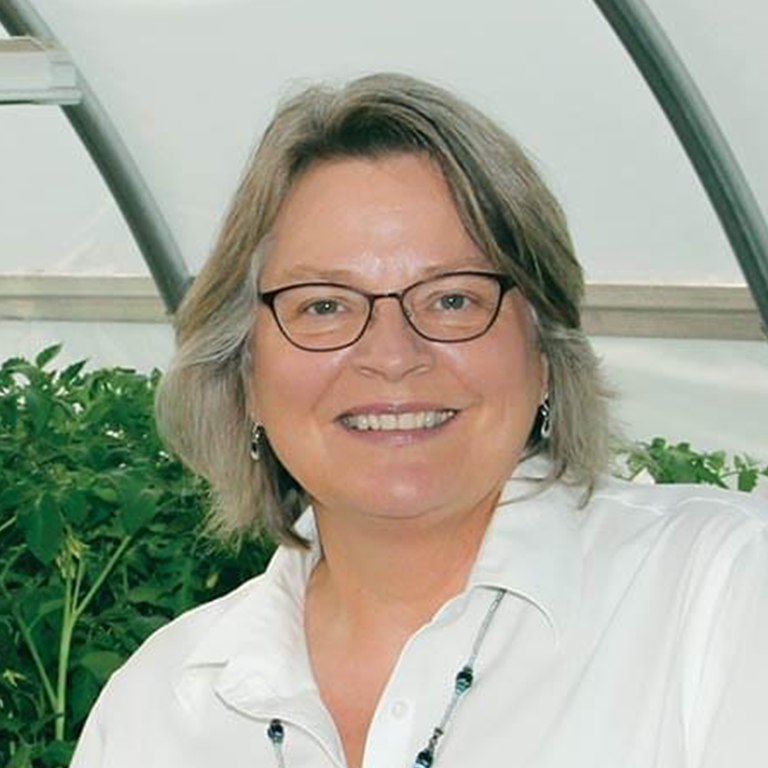
Lorrie Heber
former director, White Violet Center for Eco-justice
TERRE HAUTE—For eight years, Lorrie Heber served as director of the White Violet Center for Eco-justice, a ministry of the Sisters of Providence, focused on organic agriculture, spiritual ecology, and social advocacy. In this role, Heber worked for land sustainability, connected local food producers and consumers, and supported the development of local food networks through classes, workshops, and highly valued internships. She is a longtime board member of the Wabash River-focused RiverSCAPE which has helped preserve the Wabashiki Wetlands Fish and Wildlife area and its 3,500+ acres of bottomland forest. Heber also serves on the board of TREES Inc., whose mission is to replenish Terre Haute’s urban forest and moderate climate change impacts like extreme precipitation and heat. She has served on Terre Haute’s sustainability commission, which recently contributed to a climate risk and vulnerability assessment for the city and is in the process of developing Terre Haute’s first climate action plan.
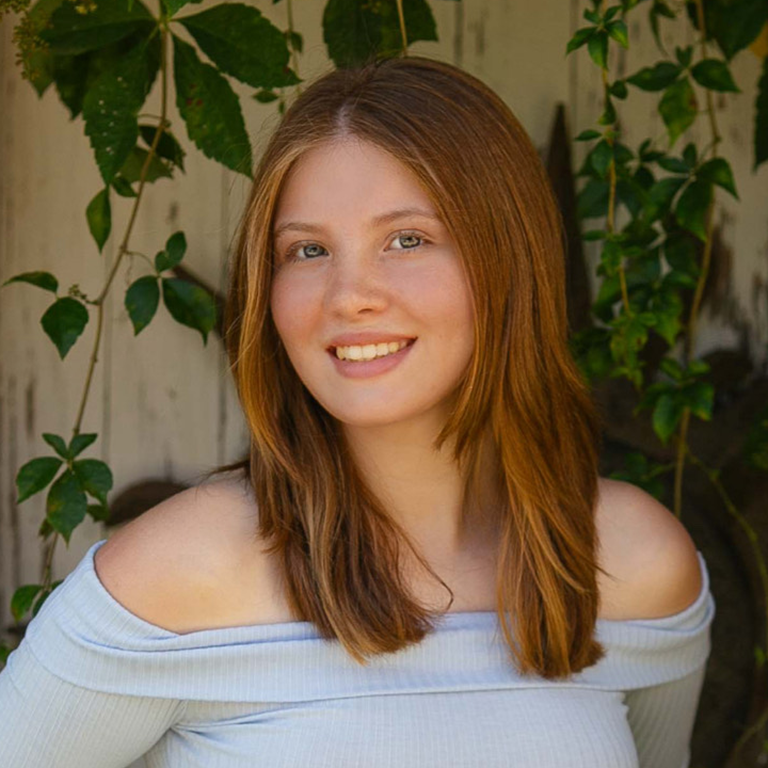
Elena Krueper
senior, Elkhart High School
ELKHART—A senior at Elkhart High School, Elena Krueper is working with the mayor and city council of her hometown on a resolution that acknowledges the threat of climate change and pledges action. If adopted, the resolution would make Elkhart the eleventh city in the state to formally commit to climate action. Krueper’s work with local government stems from her concern for the environment, passion for journalism, and involvement with Earth Charter Indiana (ECI), a nonprofit committed to advancing sustainability and care for Indiana’s environment. In 2022, Krueper joined ECI’s Youth Environmental Press Team (YEPT), an initiative focused on elevating the environmental reporting of Indiana high school journalists. In 2023, she became YEPT’s director, ensuring the organization continues to fulfill its mission. As Krueper’s climate experience has grown, so has her willingness to share what she’s learned—with peers as well as attendees of ECI’s most recent Climate Leadership Summit.
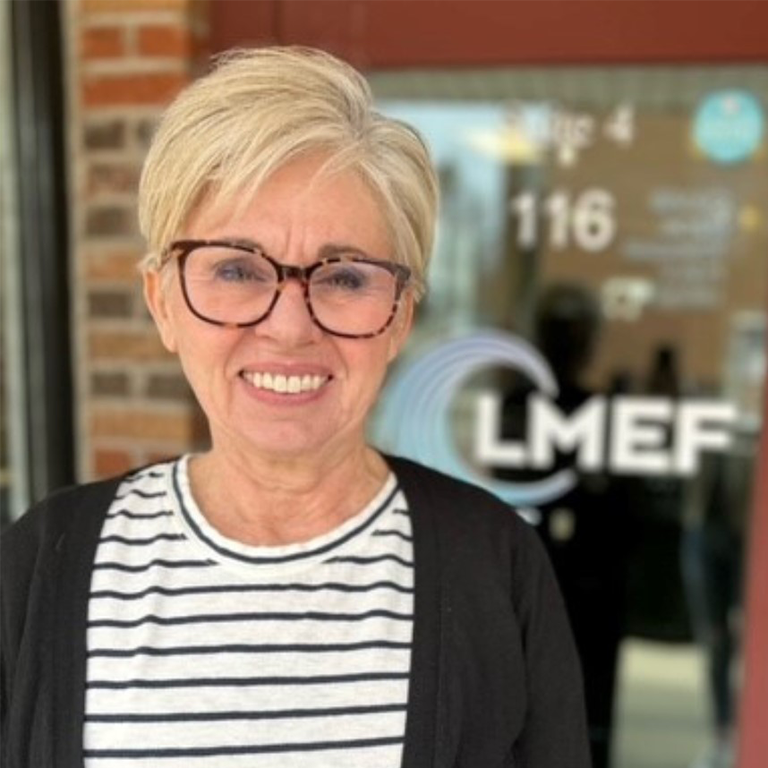
Debbie Palmer
president, Lake Maxinkuckee Environmental Fund
PLYMOUTH—For the past five years, Debbie Palmer has served as president of the Lake Maxinkuckee Environmental Fund (LMEF), which works to preserve the lake and its surrounding watershed. Palmer led LMEF through the multi-year reconstruction of a 1500-foot earthen levee, resulting in the restoration of an 80-acre wetland complex. As LMEF president, she works to engage the community on the importance of healthy ecosystems, creating activities for lake visitors, leading environmental-themed courses for K-12 students, organizing a Smithsonian watershed exhibit at the local library, and leading tours of the lake and watershed. Palmer also organized a group of volunteers, dubbed “The Stream Team,” who regularly test the health of tributaries flowing into the lake. Prior to her role at LMEF, Debbie served as the district coordinator for the Marshall County Soil and Water Conservation District, where she excelled at educating the community on how to be good stewards of the environment.
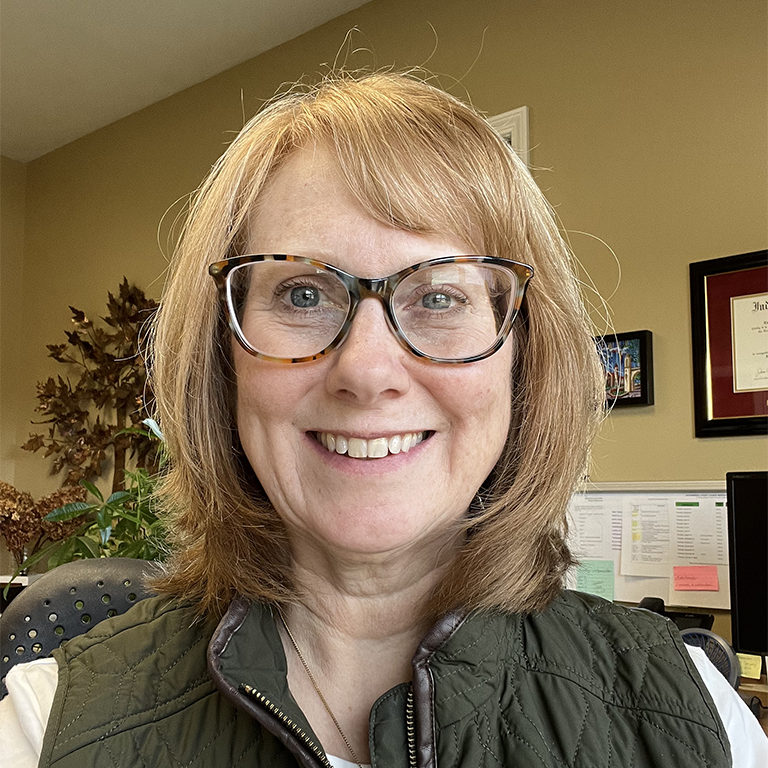
Marianne Peters
director, Marshall County Recycle Depot
PLYMOUTH—As director of the Marshall County Recycle Depot, Marianne Peters has steadily moved her community forward on multiple environmental resilience fronts while providing timely recycling and household hazardous waste disposal resources to county residents. Most recently, Peters is using a grant from the Indiana Department of Environmental Management for a recycling education program called “Transform Tomorrow.” Past efforts include making the Recycle Depot one of the first entities in the county to install solar panels, planting an acre of native plants at the facility to support pollinators and wildlife, and stocking a clean-up trailer for local groups to conduct their own trash clean-up events. Peters has been a vocal advocate for the county to create a composting facility to counter wasteful disposal practices, and in 2023, she received a community foundation grant for a feasibility study. After presenting the findings to county officials, the yard waste facility was approved and is now in the planning stages.
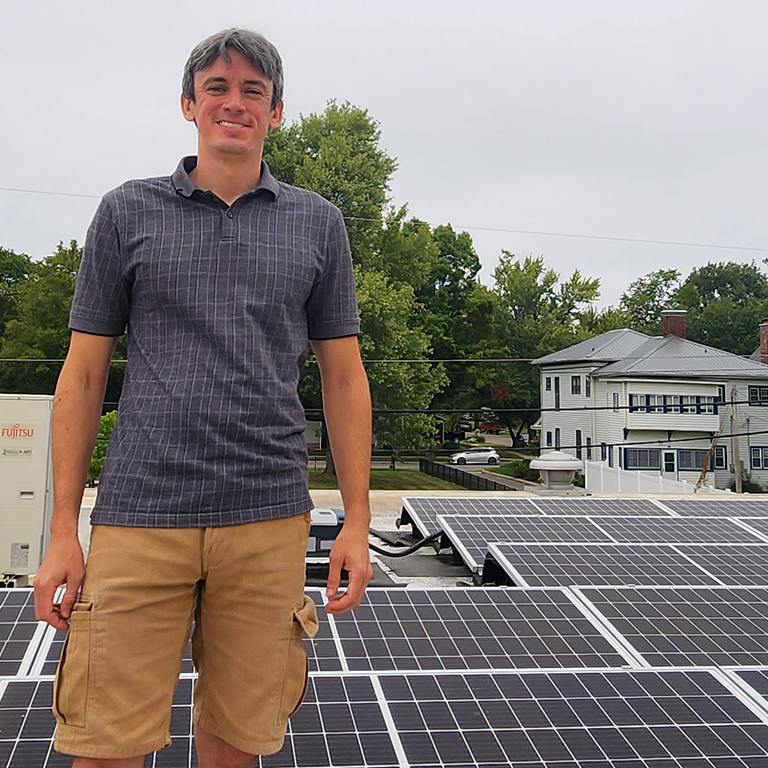
John Smillie
congressional liaison, Citizens’ Climate Lobby
CRAWFORDSVILLE— Since turning his climate anxiety into action in 2019, John Smillie has become a force for climate-friendly change in his community and beyond. Smillie has served as a climate communicator and educator for Citizen’s Climate Lobby, presenting on proposed climate legislation and federal funding opportunities for climate and sustainability projects relevant to local governments, nonprofits, and individuals. With the passage of the Inflation Reduction Act in 2022, he applied his expertise as a financial analyst to help his community understand how investments in solar power, energy efficiency, electric vehicles, and more could lower energy costs and reduce local emissions. As the chair of the League of Women Voters of Montgomery County climate team, Smillie has also advocated for building the utility-scale clean energy projects necessary to decarbonize our grid. When he found out his home was not suitable for rooftop solar, Smillie donated funds for the Montgomery County Youth Service Bureau to install its own solar panels. Since then, he has helped two other community nonprofits go solar and inspired other residents to start a fund for local clean energy projects.

Billie Warren
founder, Jibek Mbwakawen Inc.
VALPARAISO—Billie Warren, an environmental consultant and educator, advocates for diverse perspectives in environmental sustainability. Over a 20-year period, her work spans universities, municipalities, public schools, national parks, conservation groups, historical societies, and museums. A citizen of the Pokagon Band of Potawatomi, Warren bridges Western science with traditional ecological knowledge to promote Indigenous food sovereignty and plant medicine in the Great Lakes Region. Certified as a monarch expert and diversity, equity, and inclusion leader, she shares Potawatomi history and culture to address the climate crisis. Active in her Northwest Indiana community, Warren founded Jibek Mbwakawen, Inc. to promote sustainable relationships with ecosystems and served on the Pokagon Band education curriculum committee. In 2023, she was featured in a PBS special hosted by Judy O’Bannon and was nominated for an Advancing Indigenous People in STEM professional award for her climate education and advocacy.


